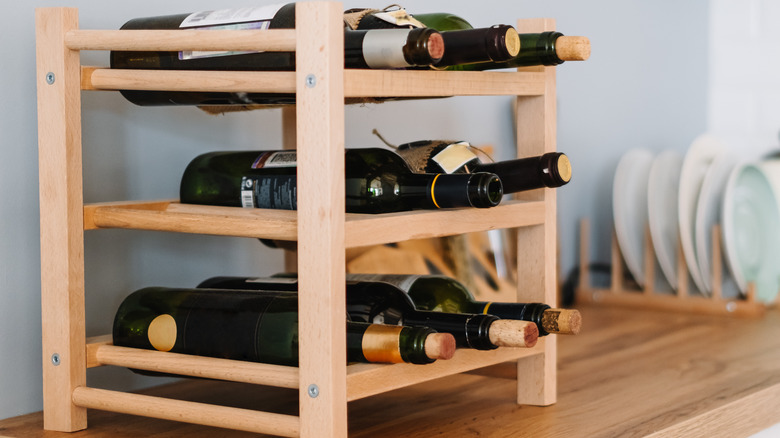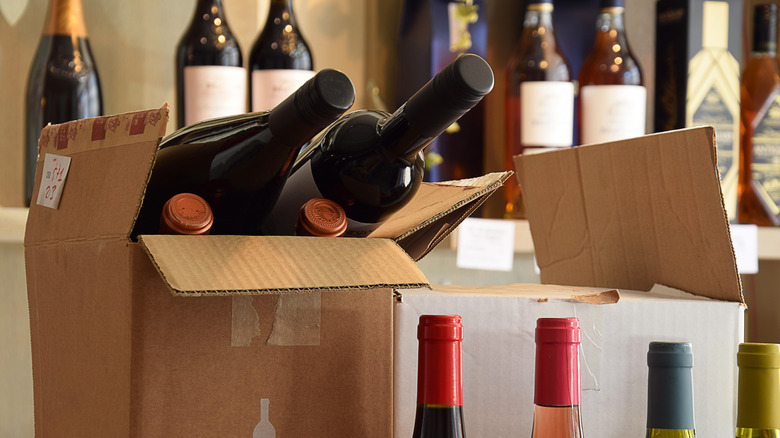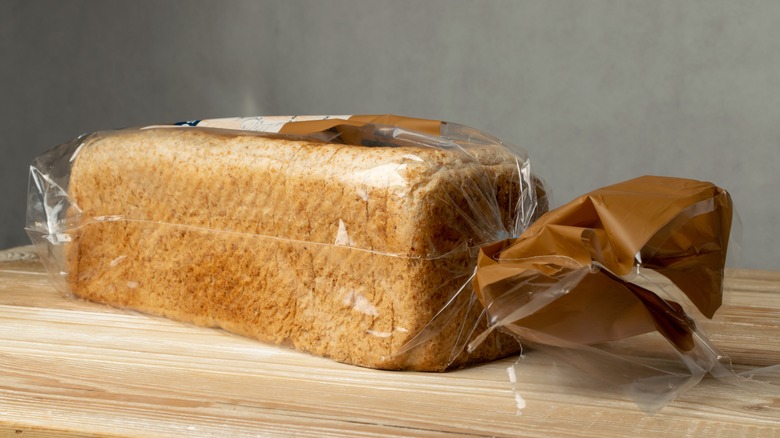Why You Should Stop Storing Wine On Top Of The Fridge
Storage can be an issue in the kitchen, especially for miscellaneous items. A common offender? Wine bottles. Typically too tall to fit on a standard cabinet shelf and too long to be stored sideways, wine bottles are tricky to stash. In kitchens that don't have a wine refrigerator, bottles seem to find a home wherever there's an open surface, be it a counter or a bar cart.
The top of the refrigerator offers a tempting opportunity to beat kitchen clutter. It's flat, open, and can accommodate quite a few bottles. Compared to high-traffic areas (like under the sink or on the counter), the fridge top keeps wine out of the way in a bustling kitchen. Plus, it maximizes storage efficiency by utilizing a space that otherwise doesn't have much use. Bottles adorning the fridge top even look like nice decorations. However, while this prime piece of kitchen real estate seems like the perfect storage solution, it's not. Storing your wine on top of the refrigerator can reduce its shelf life and potentially even ruin the bottle.
A fridge creates the wrong conditions to store wine
Storing wine on top of the fridge exposes the bottle to conditions that can lessen the quality of the beverage and accelerate aging. In Business Insider, Walker Strangis, wine expert and owner of Walker Wine Company, shares that the best temperature for wine storage is 55 degrees Fahrenheit. Anything significantly higher or lower will start to change the flavor profile of the wine. The situation to avoid at all costs? Temperature changes. "The thing that most commonly 'kills' wine is a constant fluctuation of temperatures," says Strangis. He notes that even a few weeks of fluctuating temperatures can "do unpleasant things to the wine that cannot be undone". As a large appliance constantly sucking up electricity, your refrigerator will generate heat as it hums along. This heat will likely raise the temperature far above the recommended zone and will lead to constant variations in temperature as the fridge cycles on and off.
All that humming leads to another issue: vibration. As the refrigerator runs, it emits slight vibrations. A study in the Journal of Food Composition and Analysis showed that exposure to vibration can change the chemical composition of wine. Notably, vibration caused the amount of tannins to decrease and the acidity to increase. Over time, this can radically alter a wine's flavor.
What else to leave off your fridge
Wine isn't the only item that's best left off the top of the fridge. The warm air can rapidly spoil another common kitchen ingredient that's difficult to store: bread. "It's so warm up there that whatever moisture is trapped in the container or the bag for the bread will start to help it mold," says chef Jennifer Hill Booker in Business Insider.
Besides ruining food, storing items on top of the refrigerator can pose a fire hazard. In an interview with Reader's Digest, Capt. James Flynn of the fire department in Denver, North Carolina, outlines concerns about fridge storage. "Top storage can impact the ventilation of the refrigerator," he says. Poor ventilation can lead to a heat build-up, which "can lead to reduced appliance life at best and [be] a potential fire hazard in a worst-case scenario." To avoid spoiling food and creating a dangerous environment, you might just want to keep the top of your fridge clear.


